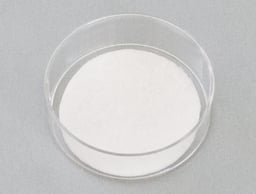Collagen Sponge for 35mm Culture Dish
KKN-CS-35
Brand: AteloCell®
Lyophilized collagen sponge made from insoluble type I collagen derived from bovine Achilles tendon.

Currency:
| Product name | Catalog number | KOKEN Code | Pack size | Price | Price (USD) | Price (GBP) | Price (EUR) |
|---|---|---|---|---|---|---|---|
| Collagen Sponge for 35mm Culture Dish | KKN-CS-35 | CS-35 | 5 pieces | (select above) | $ 382.00 | £ 377.00 | € 441.00 |
Note: prices shown do not include shipping and handling charges.
Product Information
The collagen sponge is a collagen-based device developed for three-dimensional cell culture. The collagen porous sponge is prepared from an insoluble type I collagen isolated from bovine Achilles tendon. This sponge is natural bovine collagen (not atelocollagen). Cells will penetrate the sponge and proliferate in three-dimensions.
The collagen sponge (KKN-CS-35) is a disc shape of 32 mm in diameter and 1 mm thick.
KOKEN company name and logo and AteloCell brand are the property of KOKEN Corp. Ltd., Japan.
Product Name: Collagen sponge (native) for 35mm culture dish
Catalog Number: KKN-CS-35
Size: 5 pieces
Storage and Stability: Store at Room Temperature
Sterility: Sterile
Notice To Purchaser: REPROCELL is a licensed global distributor of KOKEN’s collagen-derived products everywhere, except for Japan.
Manufacturer: Koken Co., Ltd. (Japan)
Specification Sheets:
- Lu H, et al. Comparison of decellularization techniques for preparation of extracellular matrix scaffolds derived from three-dimensional cell culture. (2012) J Biomed Mater Res A. 100(9):2507-2516.
- Kobayashi Y, et al. Synthesis of functional artificial lymphoid tissues. (2011) Discov Med. 12(65):351-362.
- Kitajima T, et al. A fusion protein of hepatocyte growth factor for immobilization to collagen. (2007) Biomaterials. 28(11):1989-1997.
- Okamoto N, et al. Artificial lymph nodes induce potent secondary immune responses in naive and immunodeficient mice. (2007) J Clin Invest. 117(4):997-1007.
- Ueno A, et al. Constitutive expression of thrombospondin 1 in MC3T3-E1 osteoblastic cells inhibits mineralization. (2006) J Cell Physiol. 209(2):322-332.
- Suematsu S, et al. Generation of a synthetic lymphoid tissue-like organoid in mice. (2004) Nat Biotechnol. 22(12):1539-1545.
- Yasui T, et al. Determination of collagen fiber orientation in human tissue by use of polarization measurement of molecular second-harmonic-generation light. (2004) Appl Opt. 43(14):2861-2867.
- Yamanouchi K, et al. Bone formation by transplanted human osteoblasts cultured within collagen sponge with dexamethasone in vitro. (2001) J Bone Miner Res. 16(5):857-867.
- Fujimoto E, et al. Beneficial effect of basic fibroblast growth factor on the repair of full-thickness defects in rabbit articular cartilage. (1999) Arch Orthop Trauma Surg. 119(3-4):139-145.